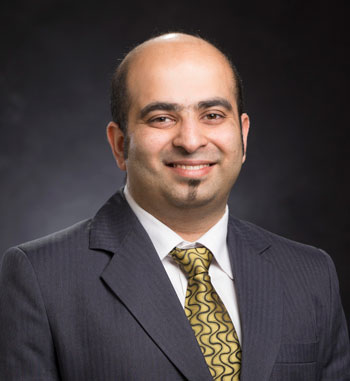Girish Chowdhary awarded Air Force young investigator grant
Tuesday, March 17, 2015

Dr. Girish Chowdhary, assistant professor in the School of Mechanical and Aerospace Engineering at Oklahoma State University, has been awarded a $120,000, three-year grant to improve the autonomous operation of unmanned aircraft from the Air Force Office of Scientific Research (AFOSR) through its Young Investigator Research Program.
“It will enable me to pursue leading edge basic research in the field of autonomy,” said Chowdhary. “I expect this work to form a foundation for my goal of developing algorithms to enable autonomous unmanned aircraft (UA) that work with humans in solving challenging tasks in complex, asymmetric, and dynamically changing environments.”
Chowdhary’s research proposal, Robust Adaptive Autonomy in Contested Environments, seeks to develop theoretical underpinnings for mixed manned and unmanned aerial teams. Unmanned aircraft have already seen deployment and success in diverse battle arenas, however, the current heavily supervised UA operation is not well matched with the emerging needs of conflict. Chowdhary’s work includes the development of novel adaptive learning and decision-making algorithms that can provide improved mission performance in dynamically changing contested environments.
AFOSR will award approximately $16.6 million in grants to 57 scientist and engineers from 43 research institutions and small businesses. The Young Investigator Research Program is open to scientists and engineers who received Ph.D. or equivalent degrees in the last five years and who show exceptional ability and promise for conducting basic research. This year the Air Force received more than 200 proposals.
Dr. Chowdhary finished his Ph.D. in aerospace engineering at the Georgia Institute of Technology and joined the OSU faculty in 2013. His areas of interest include large-scale and long-duration collaborative autonomy with particular focus on unmanned aerial systems, adaptive-optimal control and decision making for stochastic dynamical systems, including adaptive control, reinforcement learning, partially observable Markov decision processes or transfer learning of control and decision making policies.
For more information on the College of Engineering, Architecture and Technology at OSU, visit www.ceat.okstate.edu.
